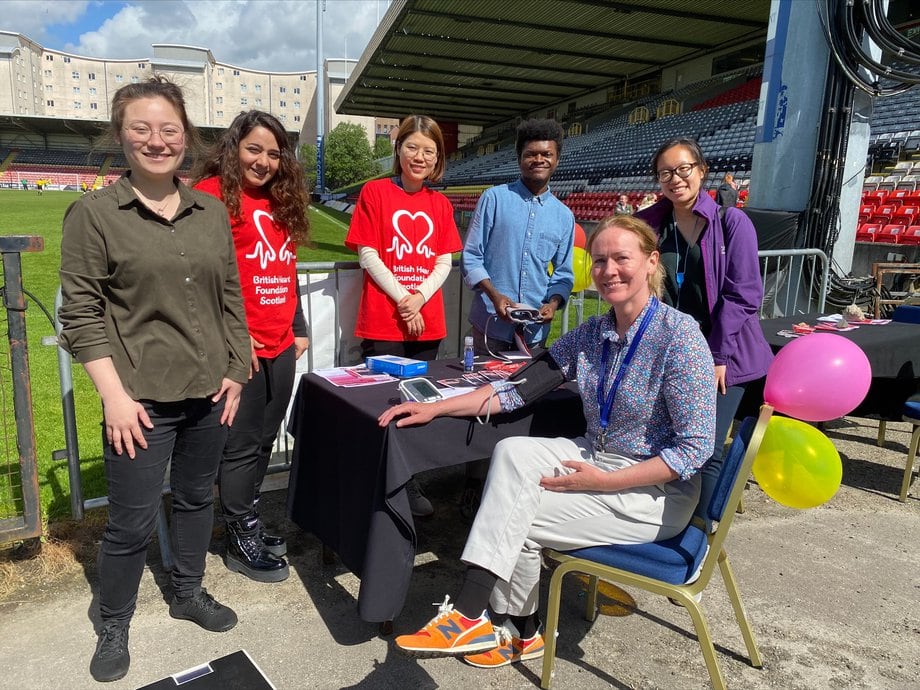How To Encourage Hypertension Awareness In The Community?

Hypertension, also known as high blood pressure, is a prevalent health issue affecting individuals worldwide. It is a major risk factor for cardiovascular diseases, such as heart attacks and strokes, and is responsible for a significant number of deaths each year.
Despite the seriousness of this condition, many individuals remain unaware of their hypertension status, leading to delayed or inadequate management. Therefore, it is crucial to develop strategies to encourage hypertension awareness in the community.
This article aims to provide evidence-based recommendations on how to promote hypertension awareness effectively. By understanding the importance of hypertension awareness, educating the community on the risks and symptoms of hypertension, promoting regular blood pressure checks, encouraging a healthy lifestyle, supporting stress management techniques, fostering supportive networks and resources, advocating for hypertension awareness in schools and workplaces, and monitoring and evaluating the impact of awareness campaigns, communities can take a proactive approach in addressing hypertension and its associated complications.
Key Takeaways
- Blood pressure screenings and assessments are important for identifying individuals at risk for hypertension.
- Partnering with community centers can extend the reach of hypertension awareness initiatives.
- Implementing strategies in schools, workplaces, and community centers can promote hypertension awareness.
- Monitoring and evaluating campaigns is essential for assessing the effectiveness of awareness initiatives.
Understand the Importance of Hypertension Awareness
Understanding the importance of hypertension awareness is crucial in promoting public health and preventing the negative consequences associated with the condition.
Hypertension, or high blood pressure, is a prevalent cardiovascular disease that affects a significant portion of the global population. It is a major risk factor for heart disease, stroke, and other serious health conditions.
Thus, raising awareness about hypertension is essential for improving overall health outcomes and reducing healthcare costs.
To effectively promote hypertension awareness, it is important to consider strategies for reaching marginalized communities. These communities often face greater barriers to accessing healthcare and may have limited knowledge about hypertension and its impact on health.
Implementing culturally appropriate education programs, community outreach initiatives, and partnerships with trusted community leaders can help increase awareness and encourage individuals to seek screening and treatment for hypertension.
Additionally, leveraging technology and social media platforms can help disseminate information to a wider audience and facilitate engagement with marginalized communities.
By addressing the unique challenges faced by these communities, hypertension awareness can be effectively promoted and public health outcomes improved.
Educate the Community on the Risks and Symptoms of Hypertension
To foster a greater understanding of the prevalence and potential consequences of high blood pressure, it is crucial to disseminate comprehensive information about the various risks associated with hypertension and the subtle symptoms that should not be overlooked.
- Risks management:
- Emphasize the importance of regular blood pressure screenings to identify individuals at risk.
- Educate the community about lifestyle modifications such as maintaining a healthy weight, consuming a balanced diet low in sodium, and engaging in regular physical activity.
- Encourage individuals with hypertension to adhere to prescribed medications and attend regular medical check-ups to monitor their blood pressure levels.
- Hypertension prevention:
- Raise awareness about the link between hypertension and other chronic conditions like heart disease and stroke.
- Promote community initiatives that focus on fostering healthy behaviors and reducing risk factors.
- Collaborate with healthcare professionals to provide educational resources and workshops on hypertension prevention strategies.
By addressing these key aspects, the community can be better equipped to manage the risks associated with hypertension and make informed decisions to prevent its onset.
Promote Regular Blood Pressure Checks
Regular blood pressure checks play a crucial role in ensuring individuals are aware of their cardiovascular health and can take proactive measures to manage any potential risks. Blood pressure monitoring is a simple and effective way to detect hypertension early. It allows individuals to track their blood pressure levels over time, identify any fluctuations, and take appropriate actions to prevent complications.
To promote regular blood pressure checks in the community, community engagement is essential. Health organizations can organize awareness campaigns and educational programs to emphasize the importance of blood pressure monitoring. They can collaborate with local clinics and healthcare providers to offer free or low-cost blood pressure screenings at community events. Additionally, community leaders and influencers can play a significant role in encouraging regular blood pressure checks by sharing their own experiences and advocating for preventive healthcare measures.
Encourage a Healthy Lifestyle
Implementing healthy lifestyle habits is vital in maintaining cardiovascular health and preventing potential risks.
Encouraging a healthy lifestyle is an effective way to raise hypertension awareness in the community.
Promoting healthy eating habits is crucial in managing blood pressure levels. Encouraging individuals to consume a balanced diet rich in fruits, vegetables, whole grains, and lean proteins can help reduce the risk of hypertension.
Additionally, promoting physical activity is essential for maintaining cardiovascular health. Regular exercise, such as aerobic activities, can lower blood pressure and improve overall heart health. Encouraging community members to engage in at least 150 minutes of moderate-intensity aerobic activity per week can have significant benefits.
By emphasizing healthy eating and physical activity, individuals can take proactive steps towards preventing and managing hypertension.
Support Stress Management Techniques
Promoting the adoption of stress management techniques can provide individuals with effective strategies for reducing stress levels and improving overall well-being. Chronic stress has been linked to the development and exacerbation of hypertension, making stress reduction an important component of hypertension awareness.
Relaxation techniques, such as deep breathing exercises, meditation, and progressive muscle relaxation, have been shown to be effective in reducing stress and lowering blood pressure. These techniques work by activating the body’s relaxation response, which counteracts the physiological effects of stress.
Additionally, incorporating regular physical activity, maintaining a healthy diet, and getting enough sleep can also help in managing stress levels.
By encouraging the adoption of stress management techniques, individuals can not only reduce their risk of hypertension but also improve their overall quality of life.
Foster Supportive Networks and Resources
Creating a network of supportive resources can provide individuals with the necessary tools and assistance to effectively manage stress and improve their overall well-being. Community engagement plays a crucial role in fostering such networks and ensuring that individuals have access to the resources they need.
One way to promote hypertension awareness and support stress management is through outreach programs. These programs can involve collaborations with healthcare professionals, community organizations, and local businesses to offer educational workshops, support groups, and wellness activities. By organizing these events, community members can learn about stress management techniques, such as relaxation exercises and mindfulness practices, and connect with others who share similar experiences.
Additionally, outreach programs can provide information on available resources, such as counseling services and helplines, which can further support individuals in their journey towards managing stress and improving their overall well-being.
Advocate for Hypertension Awareness in Schools and Workplaces
Advocating for hypertension awareness in schools and workplaces involves incorporating educational programs and resources to increase knowledge about the condition and its prevention. By targeting these specific settings, a significant portion of the population can be reached, leading to a greater understanding and management of hypertension.
To effectively advocate for hypertension awareness, it is important to consider the following strategies:
- Collaborate with healthcare providers: Working together with healthcare professionals can ensure that accurate and up-to-date information about hypertension is disseminated to schools and workplaces.
- Implement educational programs: Developing programs that focus on the causes, symptoms, and prevention of hypertension can empower individuals to make informed decisions about their health.
- Offer screenings and assessments: Providing opportunities for blood pressure screenings and assessments can help identify individuals who may be at risk for hypertension and promote early intervention.
- Engage community centers: Partnering with community centers can extend the reach of hypertension awareness initiatives, making them more accessible to a diverse range of individuals.
By employing these strategies, advocates can effectively promote hypertension awareness in schools, workplaces, and community centers, ultimately contributing to the prevention and management of this condition.
Monitor and Evaluate the Impact of Awareness Campaigns
To accurately assess the effectiveness of awareness campaigns, it is imperative to establish a robust monitoring and evaluation framework that measures the impact of these initiatives on individuals’ knowledge, attitudes, and behaviors towards hypertension. Evaluating the effectiveness of awareness campaigns allows for tracking progress and making informed decisions regarding future interventions. It provides valuable insights into the reach and engagement of the campaign, as well as its impact on the target audience.
One way to monitor and evaluate the impact of awareness campaigns is through the use of surveys and questionnaires. These tools can assess changes in knowledge and awareness levels before and after the campaign, as well as attitudes and behaviors towards hypertension. Additionally, tracking website traffic and social media analytics can provide valuable information on campaign reach and engagement.
Table:
| Evaluation Methods | Description |
|---|---|
| Surveys and questionnaires | Assess changes in knowledge, attitudes, and behaviors |
| Website traffic analysis | Track campaign reach and engagement |
| Social media analytics | Provide insights into campaign effectiveness and audience engagement |
| Focus groups and interviews | Gather qualitative data on campaign impact and individual experiences |
Frequently Asked Questions
How does hypertension affect different age groups?
Hypertension affects different age groups in various ways. Younger individuals may experience secondary hypertension due to underlying medical conditions, while older adults are more likely to develop primary hypertension. Hypertension prevention and treatment are essential for all age groups.
Are there any specific populations that are more at risk for developing hypertension?
Specific populations at higher risk for developing hypertension include older adults, individuals with a family history of hypertension, those with a sedentary lifestyle, individuals with a poor diet high in sodium and low in potassium, and certain ethnic groups such as African-Americans and Hispanics.
What are some common misconceptions about hypertension?
Some common misconceptions about hypertension include the belief that it only affects older individuals, that it is not a serious condition, and that it can be cured with medication alone. Treatment options for hypertension include lifestyle changes and medication.
Can hypertension be managed solely through lifestyle changes, or is medication always necessary?
The management of hypertension can involve a combination of lifestyle changes and medication. While lifestyle modifications such as diet and exercise can help to control blood pressure, medication may be necessary in certain cases. Alternative therapies for hypertension have not been proven to be effective.
How can hypertension awareness campaigns be tailored to reach different cultural communities?
Cultural sensitivity and addressing language barriers are crucial in tailoring hypertension awareness campaigns to reach different cultural communities. Understanding cultural norms and values, utilizing appropriate languages, and engaging community leaders can enhance the effectiveness of these campaigns.








